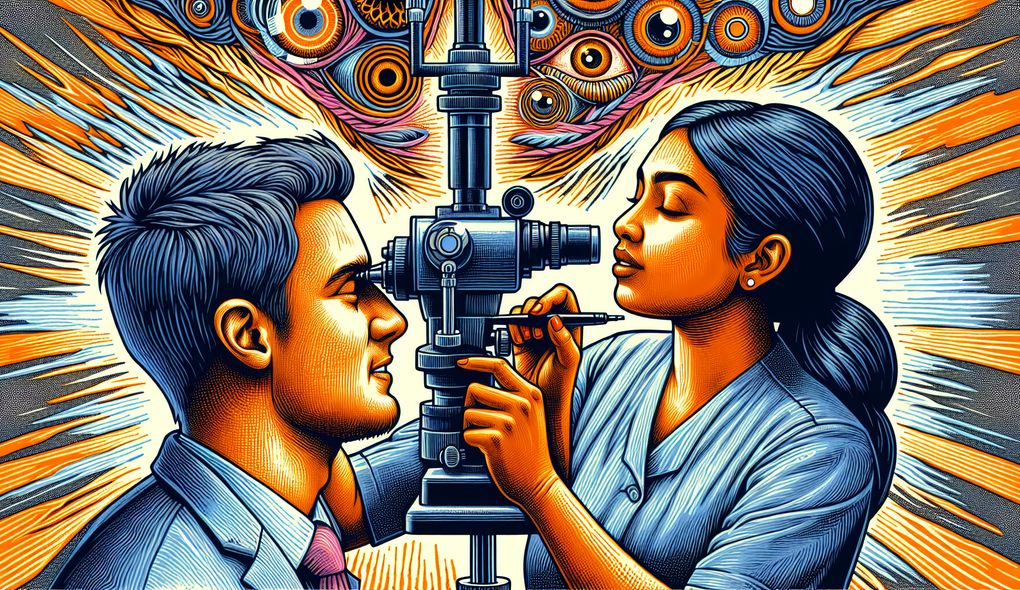Tell us about a time when you had to educate a patient about a complex eye disease or treatment. How did you ensure they understood?
INTERMEDIATE LEVEL

Sample answer to the question:
I had a patient who was diagnosed with a complex eye disease called macular degeneration. To ensure the patient understood the disease and treatment options, I took a personalized approach. I explained the disease using simple language and visuals, like diagrams and models, to help them grasp the concept. I also provided informational brochures and online resources for the patient to review at home. To ensure their comprehension, I asked the patient to summarize what they learned and encouraged them to ask questions. Additionally, I scheduled follow-up appointments to address any concerns or clarify information. Through these efforts, I was able to educate the patient about their complex eye disease and treatment in a way that they understood.
Here is a more solid answer:
I had a patient diagnosed with macular degeneration, a complex eye disease. To ensure their understanding, I employed several strategies. Firstly, I began by assessing the patient's baseline knowledge of the disease to tailor my approach. Then, using clear and concise language, I explained the disease process, its impact on vision, and available treatment options. I utilized various educational tools such as diagrams, models, and patient-friendly brochures to enhance comprehension. To gauge their understanding, I encouraged the patient to ask questions and summarize the key points. Additionally, I provided them with reputable online resources and scheduled follow-up appointments to address any further inquiries. By employing these strategies, I ensured the patient grasped the complexities of their eye disease and treatment.
Why is this a more solid answer?
The solid answer expands upon the basic answer by including specific details and examples to demonstrate the candidate's communication and education skills. It includes additional strategies such as assessing baseline knowledge, utilizing educational tools, and providing online resources, which further enhance the candidate's ability to educate the patient. However, it can be improved by providing more details on the treatment options and addressing the evaluation area of providing pre and post-operative care.
An example of a exceptional answer:
During my time as a nurse practitioner, I encountered a patient with macular degeneration, a complex eye disease. To ensure the patient's comprehensive understanding, I adopted a patient-centered approach. Firstly, I established rapport and assessed their knowledge and concerns. Recognizing the importance of visual aids, I utilized state-of-the-art ophthalmic tools, such as fundus photography, to capture and discuss the specific characteristics of their eye disease. I also utilized customized educational materials, including interactive online modules and video tutorials, to enhance their learning experience. Moreover, I collaborated with the ophthalmologist to provide a detailed explanation of the available treatment options, including anti-vascular endothelial growth factor (VEGF) injections and low vision aids. Emphasizing the patient's active role in decision-making, I employed shared decision-making techniques to address their preferences and individualize their treatment plan. Furthermore, I ensured continuity of care by scheduling regular follow-up appointments to monitor their progress and reassess their understanding. By employing this comprehensive approach, I successfully educated the patient about their complex eye disease and treatment, empowering them to actively participate in their own ocular health.
Why is this an exceptional answer?
The exceptional answer provides a comprehensive and detailed account of how the candidate educated a patient about a complex eye disease. It includes specific strategies such as utilizing state-of-the-art ophthalmic tools, customized educational materials, and shared decision-making techniques. The answer also addresses the evaluation areas of providing pre and post-operative care and emphasizes the importance of empowering the patient to actively participate in their ocular health. Overall, the exceptional answer demonstrates the candidate's exceptional communication and education skills and their ability to deliver patient-centered care.
How to prepare for this question:
- Familiarize yourself with various eye diseases and their treatments.
- Stay up-to-date with the latest advancements in ophthalmic care.
- Develop your communication skills to effectively convey complex medical information to patients in a clear and concise manner.
- Explore different educational tools and resources, such as diagrams, models, and online modules, to support patient understanding.
- Practice active listening and empathy to address patient concerns and personalize the education process.
- Learn about shared decision-making techniques to involve patients in treatment decisions.
What are interviewers evaluating with this question?
- Communication and Education Skills

